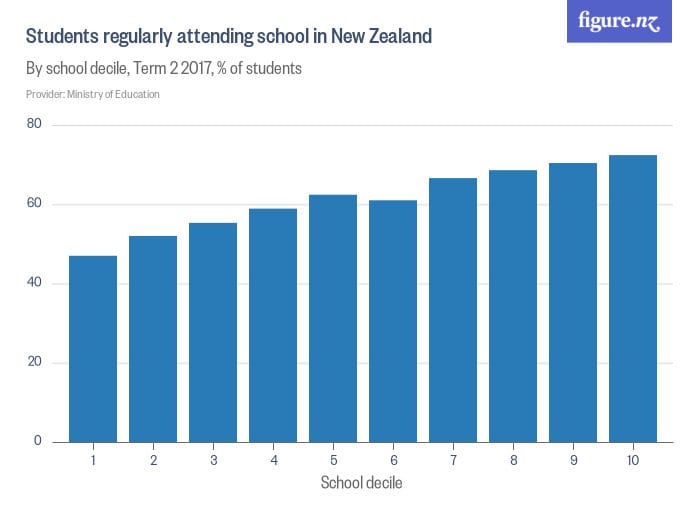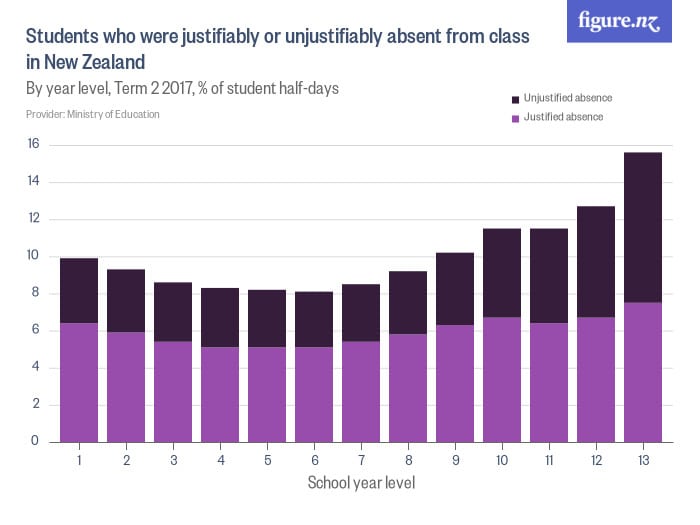Wagging, ditching class, skipping school … whatever the kids these days call it, it’s just part of a real issue for New Zealand’s education system.
The walkout today by around 100 students at Fraser High School in protest at their principal’s comments regarding truancy has also brought attention to the problem of falling attendance in New Zealand schools.
A survey carried out by the Ministry of Education in Term 2 of 2017 revealed that over 280,000 students were regularly absent from school. That’s more than a third of all students. For the survey, a student was considered to be attending regularly if they were present at school for more than 90% of all halfdays during the term.

Graph: Students attending regularly: having attended more than 90% of all school time in Term 2, where time is measured in half-days. Source: Figure.nz
NB Students in high-decile schools attended more than those in lower-decile schools, with 72% attending regularly in decile 10 schools compared to 47% in decile 1 schools.
Why are kids absent from school?
If the figure of 280,000 students absent from school seems almost impossible to comprehend, bear in mind that this figure includes both justified and unjustified absences. And those definitions really do depend on the school’s own policy regarding justified reasons for non-attendance. Justified absences can include illness, medical appointments, extreme weather conditions affecting school/travel, and a student being suspended.
NB Attendance declines in the senior secondary years, with female students attending less than male students in Years 11 to 13.
Unjustified reasons may include unreported illness, family holidays during term time, staying home to look after siblings, etc. And, of course, being truant!
There are plenty of other reasons for kids not attending school – every parent could probably come up with a few that have caused absence that aren’t related to a child simply not wanting to go to school. For instance, trying to find a suitable school due to special needs, withdrawing a child due to bullying, housing issues, circumstances surrounding poverty (ie, no uniform or lunch), extreme tiredness, and the list goes on.
Does it matter if they miss a few days of school?
Almost every kid is going to have a few days off in a school year due to illness, appointments, etc. But it is the continued absence on a regular basis of those children who aren’t interested in attending school that can have detrimental effects on their education. In our curriculum-led education system, it is imperative that students don’t miss too many lessons or they fall behind. In the MOE survey, term 2 attendance in Year 11 was strongly linked with attainment of NCEA Level 1. About 90% of NCEA Level 1 students attending every class in Term 2 achieved NCEA that year, compared to 60% of those who missed a quarter of the term. (Source: Educationcounts.govt.nz)
It is worth remembering though that school is not the be-all and end-all for everyone. Some people will find their path later than others and attend other education establishments, seek out on-the-job training, or start their own business. But for most, taking up the education opportunities offered by primary and secondary school is too good to miss.
This article was written by Julie Scanlon, Editor for Kidspot NZ. Sources includes Educationcounts.govt.nz.
Read more on Kidpsot:
- 10 things teachers wished you knew
- 9 tips to help kids prepare for tests
- What do you want your children to learn?








I think school is an important part of every child’s life. Their education is important but so is the social skills they learn being at school. My eldest son says there are often children who are away in his class due to them playing online games and that is a shame that gaming gets in the way of their education.
To be honest sometimes schools can also feel very restrictive for kids…some kids thrive at them, and some don’t. We probably need a better system and how to not use absences as exactly a bad thing for students to take. Other than illnesses and such, sometimes a good break is what’s needed.
There are lots of reasons why someone in a lower decile school may be staying home as well. Maybe there was no food for lunch, maybe they didnt have any clean clothes, maybe they had their periods and nothing to use. Maybe they had to look after siblings or an unwell parent.
my boys have had a few unplanned absences from school esp end of last year with being homeless and then having to move to new area, new school which meant new uniforms stationary etc….it deff affected their schooling and in particular my older boy who was in year 6 but they with the help of the amazing school and themselves managed to get them caught up, but it was a nice reminder just how important going to school everyday unless sick or a death in family is. I totally get for some families just how tough it can be esp if the kid(s) have no lunch and staying home means they’ll at least have spaghetti for lunch Ive been there myself. But reaching out to the school can be so so helpful and we all have a common goal…making sure the children get the best education possible.
Our daughter was absent from the first term of school (she’s 5) for about 30% – this is pretty high and the majority of that time was sickness. I don’t send her to school if she’s sick, she doesn’t have to be really bad either, I don’t like her attending school if she’s not well, not to mention spreading her germs to other kids which isn’t fair.
I am hoping by the time my kids get to secondary school that they are not like some of the other kids not going to school. I do agree with these findings that higher decile schools have higher attendance than lower decile we see this in our community. Secondary schooling is a lot harder too as you really need to get to really try hard in all aspects of schooling.